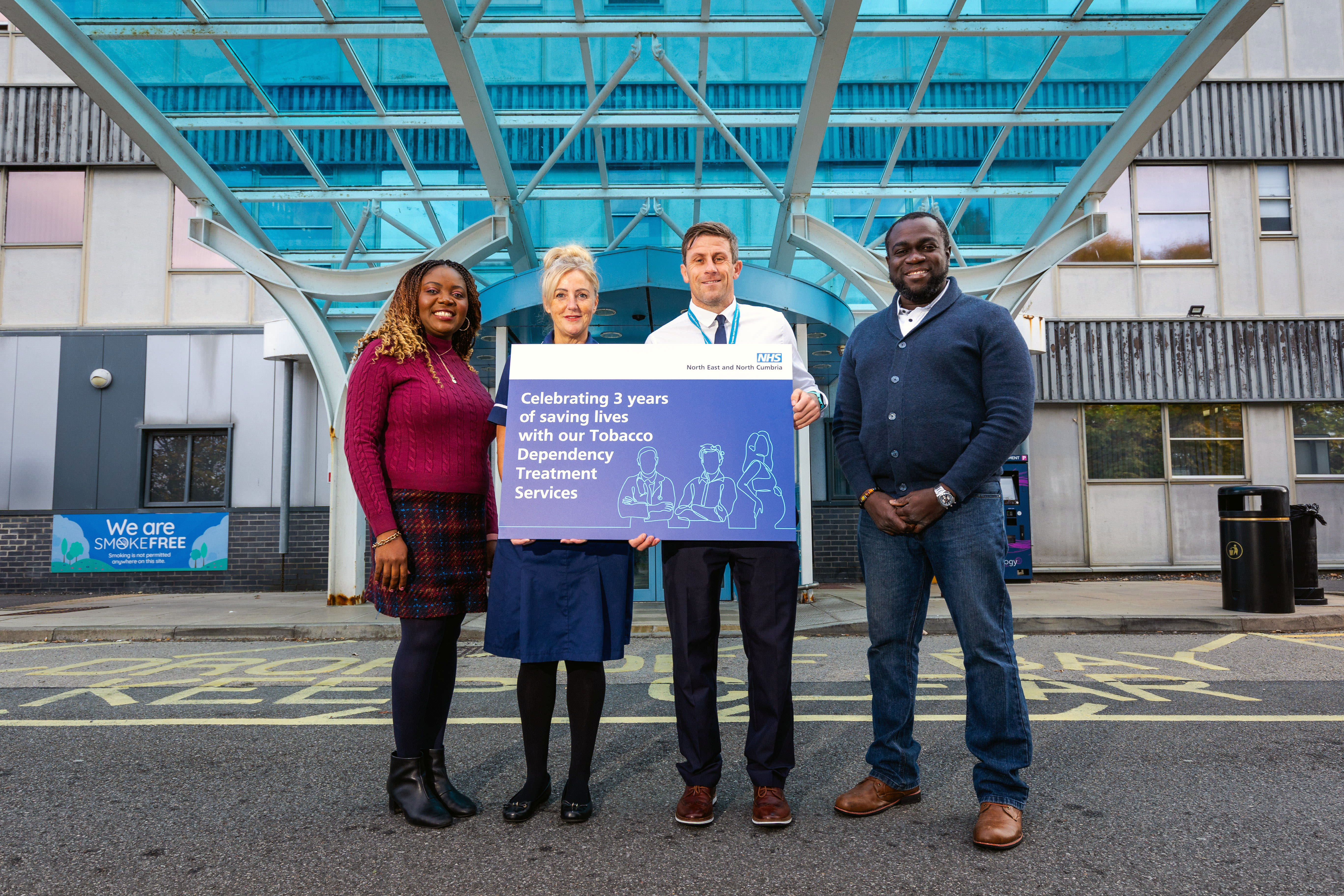Published on: 5 November 2025
Lives are being saved and thousands of hospital admissions prevented in the North East and North Cumbria three years after the launch of teams to help support patients to stop smoking.
The North East and North Cumbria Smokefree NHS Programme is celebrating 3 years since all 10 NHS Foundation Trusts launched their onsite Tobacco Dependency Treatment Teams.

South Tyneside and Sunderland NHS Foundation Trust Tobacco Dependency Treatment Team
Since then, around 95,845 people have been identified as smoking on admission or at booking for maternity patients, and around 67,900 patients referred to in-house NHS to help with quitting or temporary abstinence whilst in hospital.
This work is part of the NHS 10 Year Plan to reduce the harms caused by smoking – the biggest cause of preventable illness and death in the region, to help people stay healthy and reduce admissions to NHS services.
Latest figures also show adult smoking prevalence (rates) at the lowest they have ever been at 10.4% for the North East and North Cumbria compared to 29% in 2005 - and even lower for smoking during pregnancy at 7.8% (2024/25) compared with 13.1% in 2020/21.
However, smoking still costs the North East and North Cumbria NHS £145m a year in health care costs alone, with around 36,930 hospital admissions and 4,770 premature deaths a year caused by smoking.
Since its full roll out in September 2022, in-house Tobacco Dependency Treatment Services have delivered evidence-based support to patients across all of the North East and North Cumbria Integrated Care System in 10 NHS Foundation Trust hospitals and across 18 clinical pathways, working alongside clinicians to treat tobacco dependency as a medical condition.
Rachel McIlvenna, Smokefree NHS Strategic Manager, North East North Cumbria Integrated Care Board, said:
“Smoking is still the biggest cause of preventable death and one in four patients in hospital is a smoker.
“Our tobacco dependency teams across all 10 hospitals have been instrumental in changing lives. We have seen a record number of patients screened on admission or at booking, and who are now benefitting from support to quit smoking.
“We’re proud of what has been achieved and grateful to every team member who has made this possible. But the job isn’t done when too many people are becoming ill and dying from smoking. It’s vital for every health professional to see tobacco dependency as a clinical priority and ensure all patients are offered support to stop.”
Dr Ruth Sharrock, Consultant Respiratory Physician and Clinical Lead for Treating Tobacco Dependency on behalf of North East and North Cumbria NHS, said:
“As a doctor, I see every day how tobacco robs people of healthy years, triggers serious illness far too early, and leaves many trapped in a cycle of repeated hospital visits. We can prevent that.
“Smoking causes cancer, heart disease, stroke, COPD and dementia, but as we approach winter when demand on the NHS peaks, smokers suffer more severely from respiratory viruses such as flu.
“We know that many patients who smoke want to quit but are not able to access the right support to help them quit successfully and live longer and healthier lives.”
“If we can encourage more patients to be tobacco free, even if just during their treatment, we can improve recovery from illness, reduce the need for medications and reduce their chances of being re-admitted, easing pressures on our NHS now and in the future.”
Dr Shaz Wahid, Medical Director, South Tyneside and Sunderland NHS Foundation Trust, said:
"We are proud to support the work of Tobacco Dependency Treatment Services. These services have helped many patients over the past three years to stop smoking and improve their health.
"Quitting smoking can lead to fewer hospital visits, better outcomes for pregnant women, and lives saved. We will continue to support our patients with care and expert advice to help them live smokefree lives."
Dr Neil O’Brien, Chief Medical Officer, NHS North East North Cumbria Integrated Care Board, said:
"We know it's difficult for people to quit smoking, so it's vital we use every opportunity to talk to patients and support them to stop.
"Tobacco Dependency teams right across the region are helping people to quit and play an important role in our aim to have a smokefree future, free from the death and disease caused by tobacco."
Dr Rajesh Nadkarni, Medical Director and Deputy Chief Executive at Cumbria, Northumberland, Tyne and Wear NHS Foundation Trust, said:
"Tackling tobacco dependence is a crucial part of improving physical health and quality of life for our people. We know that those living with mental health conditions have some of the highest rates of smoking and the greatest burden of smoking related harm. As a mental health and disability trust addressing this inequality is central to our mission of delivering safe, high quality and effective care.
“The Tobacco Dependent Treatment Service (TDTS) plays a crucial clinical role in helping us achieve this mission. It has made a significant impact in supporting service users and staff in quitting smoking. It is assisting in our mission to embed a culture of smoke free health promoting care across all of our services. I want to thank everyone involved in this work for their commitment and drive in helping us achieve this outcome.”
The teams work collaboratively with local authority public health teams and commissioned stop smoking services particularly for patients discharged from acute inpatient hospital to ensure a smooth transfer of care.
Key achievements include:
- Identifying over 95,845 patients who smoke
- Referring over 67,900 to in house tobacco dependency services
- Supporting over 46,240 patients
- Helping 2,925 patients achieve a smoke-free outcome after 28 days or after delivery.
- Record Smoking at Time of Delivery (SATOD) low rate of 7.8%.
- Pioneering Innovating work supporting 1972 NHS Staff with 51.2% quit rate







